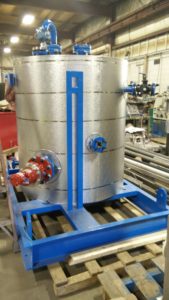Aboveground Tank Cleaning
Last updated on August 20th, 2021 at 02:00 pm
Aboveground tanks come in all shapes and sizes and are used for storing everything from rainwater to petroleum, are generally constructed of long-lasting durable materials. However, regardless of its construction and design, a storage tank is only as good as its maintenance.
An aboveground storage vessel has easier access for heaters and avoids some of the soil contamination risks of below-ground tanks. Yet, they do come with their own risks. They are more exposed leaving them vulnerable to damage from the weather, vehicles, and persons. As such, extra care is necessary for inspecting and maintaining.
The Importance of Tank Maintenance
Storage tank maintenance goes beyond simply protecting the vessel. It decreases your costs, maintains operational efficiency, and prevents product loss or degradation.
Product Integrity
Regular maintenance is important for maintaining product integrity in aboveground tanks. Sediment buildups and leaks can result in chemical degradation, the creation of sludge, or ineffective tank heating. If the stored product is compromised it can delay operations or result in product loss.
Scheduling inspections and cleaning keep the vessel in an ideal condition to store and heat the medium in its ideal state.
Repairs
Performing maintenance inspections makes all the difference between having to make a repair and having to purchase replacements. In most cases, repairs are cheaper and faster than replacing parts or an entire tank.
If problems are identified early enough, a simple cleaning is sometimes enough to fix an incipient issue. The sooner you identify an issue, the easier the repair is to make. However, without regular maintenance intervals, what should have been minor repairs can result in total system failure.
Leaks
While below ground tanks are more strictly regulated for leaks they are still a concern for any type of vessel. A leak can cause safety hazards, damage the environment, and result in significant product loss and/or degradation.
Corrosion
Many products and storage conditions leave tanks potentially vulnerable to rust. Even resistant tank materials can corrode without maintenance. Rusting from the inside out is the most common cause of failure in unmaintained tanks.
How to Clean
Inspect Exterior, Gaskets, & Connections
In case of rust, leaks, or other damage, it is always best to identify problems before product is lost or the tank is breached. Although tanks more often rust from the inside out, the exterior of the tank should still be checked for signs of corrosion, as well as physical damage.
The connections are weak points where leaks, and corrosion can occur more easily and cause significant damage. During every inspection, gaskets and connections should be checked for rust, moisture, and fit.
Interior
 Cleaning and maintaining the interior of the tank is more intensive but just as important. Any damage or contaminant buildup here will have more effect on processes and product integrity.
Cleaning and maintaining the interior of the tank is more intensive but just as important. Any damage or contaminant buildup here will have more effect on processes and product integrity.
When cleaning the interior of the tank, first explore whether the tank needs to be emptied. Some immersion tank heaters, such as over-the-side heaters can simply be removed for cleaning. This prevents the need for emptying the container or stopping processes.
Once inspecting the interior of the tank you should, once again, check for signs of corrosion. If found, assess the extent of the damage to determine the best approach for cleaning the corrosion and whether any repairs or replacements are necessary. If significant corrosion or sediment buildup are found, draining the tank may be necessary.
To clean the tank follow the protocols for the stored medium and consider tank materials. Thoroughly remove any visible damage to prevent it from recurring after the cleaning. In many instances, the cleaning process is as simple as power-washing the tank and/or heater elements.
Storage Tank Heaters
Wattco custom-manufactures electric heaters for storage tanks of all shapes, sizes, and industries. Our team of engineers works with you to select the best heater type, wattages, and configuration for your project and budget.
Contact Wattco today for storage tank heater quotes and information.

